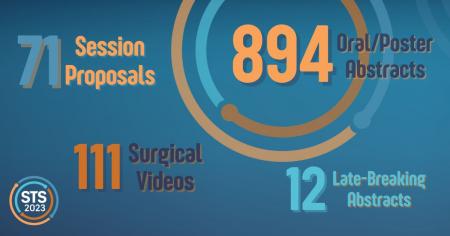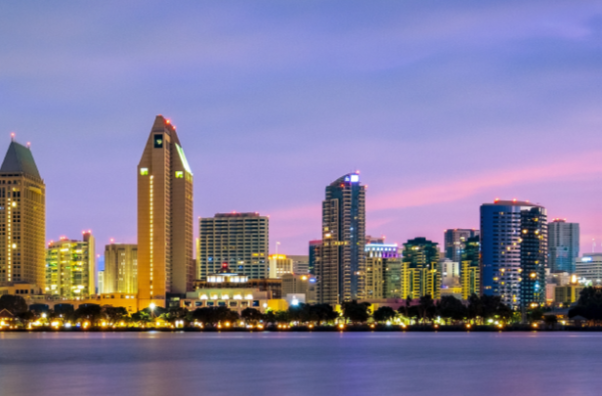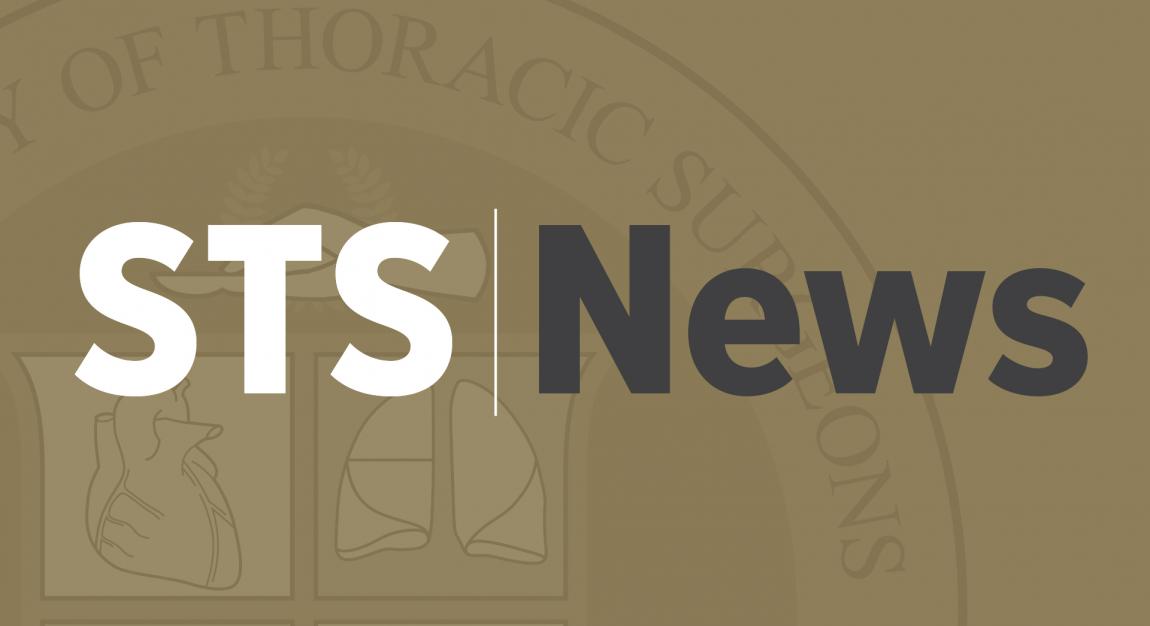After 2 years of virtual-only programming, The Society’s 59th Annual Meeting, January 21 – 23 in San Diego, California, promises an in-person experience that’s better than ever—with late-breaking abstracts, challenging case presentations, immersive experiences, and never-before-seen scientific discoveries and surgical techniques.
“The ability for colleagues and friends to gather in person for the first time in several years will be a palpable opportunity to not only share intellectual knowledge but also—perhaps more importantly—reconnect on a personal level,” said S. Adil Husain, MD, chair of the STS Workforce on Annual Meeting. “We have each experienced many unique challenges since our last in-person meeting and this reunion of sorts will be a valuable elixir for us all.”
The program planning committee received a record number of exciting abstract submissions in all subspecialty areas, Dr. Husain said. They designed the program with a focus on blending top-scoring science with highly respected invited speakers, with an emphasis on interaction and discussion time.

Adult Cardiac Offerings Target Optimal Outcomes
Parallel sessions in adult cardiac surgical topics explore why cardiac surgeons should be involved in pulmonary embolism response teams, the management of severe aortic stenosis in young adult patients, optimizing care for infective endocarditis, the heart team approach to complex tricuspid valve disease, and much more.
Hands-on courses cover annular enlargement and mitral valve repair, while “In the OR with” videos take attendees on an immersive journey as world-class surgeons demonstrate complex aortic arch reconstruction, minimally invasive mitral valve repair, and the Ross procedure. The J. Maxwell Chamberlain Memorial Paper and Richard E. Clark Memorial Paper will unveil outcomes data in large patient groups—the former on coronary artery bypass grafting versus multivessel percutaneous intervention, and the latter on the effect of surgical strategy in isolated tricuspid valve procedures.
Congenital Program Is Dynamic with Data
Data-driven outcomes, evidence-based guidelines, and optimizing the landscape for the current and future congenital surgery workforces feature prominently in the congenital surgery curriculum. “To Train or Not to Train?” will include a debate on the regulation of fellowship positions, and “Leveling the Playing Field” will explore whether it’s useful for lower-volume centers to partner with high-volume centers to deliver best results.
Engaging video and abstract presentations will demonstrate single leaflet neocuspidization with autologous pericardium, position of the autograft and homograft in the Ross-Konno procedure, neonatal palliation for high-risk single ventricle heterotaxy, and a novel hybrid palliation technique for a premature newborn prior to Norwood single ventricle palliation. The inaugural James S. Tweddell Paper investigates the creation of an STS adult congenital heart surgery risk model, and the Clark paper analyzes the STS National Database for patterns in the management of tetralogy of Fallot.
General Thoracic Sessions Showcase Next-Gen Techniques
Parallel sessions in the general thoracic program highlight topics including controversies in transplant practices, immunotherapy and targeted molecular therapy, and challenging esophageal consults, while an Ask the Experts session titled “Elegant Solutions to Lung Disasters” will show attendees how to salvage pulmonary resections gone wrong. Attendees will gain hands-on expertise in complex central airway reconstruction, and an “In the OR with” video demonstrates uniport segmentectomy and left lower lobectomy.
Among the abstracts are a 20-year experience with salvage esophageal reconstruction with colon interposition, a one-step classifier for molecular differential diagnosis between multiple primary lung cancer and intrapulmonary metastasis, the evolution of pain control for adult pectus excavatum repair, and how the number of involved structures affects outcomes in thymic epithelial tumors. The Chamberlain Paper examines racial disparities in patients awaiting lung transplant, and the Clark Paper pinpoints how urgent paraesophageal hernia repair in elderly patients is associated with worse outcomes.
Perioperative, Critical Care Topics Bring Results into Practice
An array of offerings in perioperative and critical care includes controversies in perioperative blood management, building an ERAS cardiac program without added cost, contemporary approaches to pain management, phenotypes and unique characteristics of cardiogenic and postcardiotomy shock, and new regulatory standards for resuscitation. A hands-on course covers the V3 exam—volume status, venous access, ventricular function—for CT surgery.
The Clark Paper, “The Price of Delay: RV Failure and Biventricular Support” utilizes relevant findings from the Intermacs database, and the Chamberlain Paper demonstrates that the COVID-19 pandemic is associated with increased mortality, failure to rescue, and cost across all socioeconomic statuses.
Equity Is Paramount in Wellness, Education, Quality
Surgeon wellness and career advancement take center stage at STS 2023. A “Surgical Families” session explores unique situations including adoptive parents, parents of children with special needs, surgical trainees and parents, two-surgeon households, and single-parent surgeons. A session on ergonomics helps surgeons avoid injuries that can curtail a career, and Annals Academy provides tips on publishing impactful research.
In the quality and education realms are sessions on the preoperative assessment of frailty beyond the “eyeball test” and making sense of hospital star ratings, while intriguing abstracts investigate how communication patterns in the OR are affected by task difficulty, how male versus female candidates regard diversity in selecting jobs and training programs, and harnessing natural language processing to evaluate gender bias in letters of recommendation for cardiothoracic surgery applicants.
“The plenary session invited speakers will offer a unique opportunity for attendees to self-reflect both personally and professionally,” added Dr. Husain. The Vivien T. Thomas Lecture will be delivered by Francisco G. Cigarroa, MD, who directs the transplant center at the University of Texas Health Science Center San Antonio. Bestselling author Max Lucado will present the Thomas B. Ferguson Lecture, and Peter K. Smith, MD, principal investigator for the Duke University site in the Cardiothoracic Surgery Clinical Trials Network, is this year’s C. Walton Lillehei Lecturer.
The Presidents Reception—at a bayfront restaurant and cocktail venue featuring a floating reception hall and a skyline lounge—will celebrate not only the term of current STS President John H. Calhoon, MD, but also the legacies of Past Presidents Sean C. Grondin, MD, MPH, FRCSC and Joseph A. Dearani, MD, who oversaw the Society’s governance with innovation and grace during the peak of the COVID-19 pandemic. Space is limited for the reception, and attendees must add it to their cart during registration.

“We have lost several admired colleagues in recent times, Dr. Tweddell and Dr. Grondin in particular,” said Dr. Husain. “We will value our ability to celebrate their contributions to our subspecialty as well as to acknowledge the loss of other cherished members within our Society.”
STS 2023 also heralds the return of live product demonstrations, with 150 exhibitors showcasing the latest tools and technologies for surgical practice. Industry symposia—both offsite and at the convention center this year—afford rare opportunities to practice new techniques, and product theaters let attendees experience devices and software hands-on.
For those who can’t travel to San Diego—or for those who want to do more with their in-person registration—a new option, Plenary Livestream-Plus, will allow registrants to livestream the President’s Address and named lectures from anywhere onsite or across the globe.
STS Members enjoy significant discounts on STS 2023 registration, and Resident/Fellow and Medical Student Members register for free. There’s still time to register at sts.org/annualmeeting.
